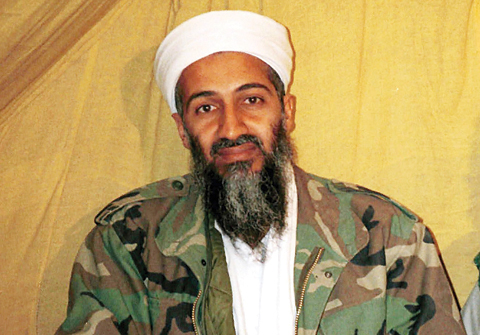 Osama bin Laden
Osama bin LadenWASHINGTON: In his handwritten will, Al-Qaeda leader Osama bin Laden claimed he had about $29 million in personal wealth - the bulk of which he wanted to be used "on jihad, for the sake of Allah". The will was released yesterday in a batch of more than 100 documents seized in a May 2011 raid that killed bin Laden at his compound in Abbottabad, Pakistan.
The Al-Qaeda leader planned to divide his fortune among his relatives, but wanted most of it spent to conduct the work of the Islamic extremist terror network behind the Sept 11 attacks. The will did not disclose much detail about where he amassed his wealth, but bin Laden's father ran a successful construction company in Saudi Arabia for years, and the will noted that $12 million was from his brother on behalf of the Bin Laden Co.
The threat of sudden death was on his mind years before the fatal raid in Pakistan. "If I am to be killed," he wrote in a 2008 letter to his father, "pray for me a lot and give continuous charities in my name, as I will be in great need for support to reach the permanent home". In a final wistful paragraph, he asks his father for forgiveness "if I have done what you did not like".
The letters were included in a batch of documents released by the Office of the Director of National Intelligence. They address a range of topics, including fractures between Al-Qaeda and Al-Qaeda in Iraq, which eventually splintered off into what is now known as the Islamic State; and bin Laden's concerns about his organization's public image and his desire to depict it as a united network.
In a letter to one of his wives who had been living in Iran, bin Laden expressed worry that her visit to a dentist could have presented the Iranians an opportunity to implant a small chip under her skin, apparently as a tracking device. "My dear wife," he began. "I was told that you went to a dentist in Iran, and you were concerned about a filling she put in for you. Please let me know in detail ... any suspicions that any of the brothers may have about chips planted in any way."
The Iranian dentist might have used a slightly enlarged syringe to make such an implant, bin Laden wrote in the letter. The US translation is undated. "The size of the chip is about the length of a grain of wheat and the width of a fine piece of vermicelli," bin Laden said. He asked her to recall the exact date of her dental work, "also about any surgery you had, even if it was only a quick pinch".
In another letter, addressed to "The Islamic Community in General," bin Laden offered an upbeat assessment of progress in his holy war since Sept 11,2001, and of US failings in Afghanistan. The letter is undated but appears to have been written in 2010. "Here we are in the tenth year of the war, and America and its allies are still chasing a mirage, lost at sea without a beach," he wrote. "They thought that the war would be easy and that they would accomplish their objectives in a few days or a few weeks, and they did not prepare for it financially, and there is no popular support that would enable it to carry on a war for a decade or more. The sons of Islam have opposed them and stood between them and their plans and objectives."
Bin Laden sought to portray the US as hopelessly mired in an unwinnable war in Afghanistan. In an undated letter that appears to have been written in the 2009-2010 period, he compared the American combat position to that of the Soviet Union in the final years of its occupation of Afghanistan in the 1980s. "America appears to be hanging on by a thin thread. Due to the financial difficulties," he wrote. "We need to be patient a bit longer. With patience, there is victory!"
One document, a hand-written note that US intelligence officials believe the Saudi militant composed in the late 1990s, laid out how he wanted to distribute about $29 million he had in Sudan. One percent of the $29 million, bin Laden wrote, should go to Mahfouz Ould Al-Walid, a senior Al-Qaeda militant who used the nom de guerre Abu Hafs Al-Mauritani. "By the way, he (Walid) has already received 20,000-30,000 dollars from it, bin Laden continued. "I promised him that I would reward him if he took it out of the Sudanese government."
Bin Laden lived in Sudan for five years as an official guest until he was asked to leave in May 1996 by the then-Islamist government under pressure from the United States. Another one percent of the sum should be given to a second associate, Engineer Abu Ibrahim Al-Iraqi Saad, for helping set up bin Laden's first company in Sudan, Wadi Al-Aqiq Co, the document said. He set down specific amounts in Saudi riyals and gold that should be apportioned between his mother, a son, a daughter, an uncle, and his uncle's children and maternal aunts. - Agencies










